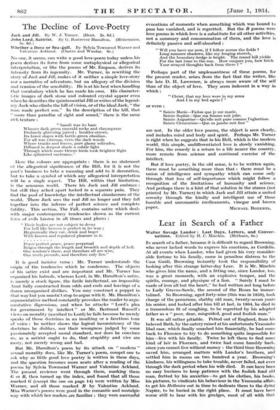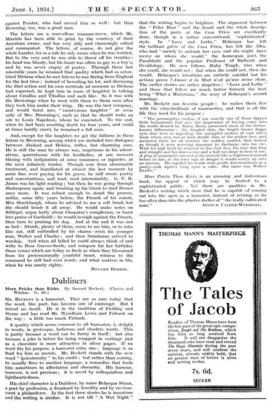Lear in Search of a Father
IN search of a father, because it is difficult to regard Browning, who never lacked words to express his emotions, as Cordelia. At all events when Landor, who had given his very consider- able fortune to his family, came in penniless distress to the Casa Guidi, Browning instantly took the responsibility of looking after this strange latter-day Lear. It is Mr. Minchin who gives him the name, and a fitting one, since Landor, too, was a great monarch, with an explosive temper, and the spirits, courage, and physique of a lion. " Surely I must be made of iron all but the heart," he had written not long before to Lady Graves-Sawle, the second of the Roses he immor- talized. So Browning, aged forty-nine (this was in 1859), took charge of the penurious, shabby old man, twenty-seven years his senior, and looked after him till at last, in 1864, he died in a tremendous fit of coughing, to be regretted by his adopted father as a " poor, dear, misguided, good and foolish man."
It was all rather pitiable. Pelted out of England, from his beloved Bath, by the outcry raised at his unfortunate Yescombe libel case, which finally smashed him financially, he had come back to Florence to try to do something quite impossible for him—live with his family. Twice he left them to find some kind of lair in Florence, and twice had come humbly back, since you cannot live without money : the third time Browning saved him, arranged matters with Landor's brothers, and settled him in rooms on two hundred a year. Browning's kindness, his willingness to take trouble, never failed, not even through the dark period when his wife died. It can have been no easy business to keep patience with the foolish fond old man, fretted by his anxieties—to get his clothes, his books, his pictures, to vindicate his behaviour in the Yescombe affair, to get his Hellenics out in time to dedicate them to the dying Napier, to be buried in the right place. It must have been worse still to bear with his grudges, most of all with that
against Forster, who had served him so well : but then Browning, too, was a great man.
The letters are a marvellous treasure-trove, which Mr. Minchin has been able to print .by the courtesy of their American owner, and has very ably and charmingly edited and commented. The letters, of course, do not give the whole Landor, for as a rule he only wrote when he was worried. But to the very end he was able to throw off his troubles : his head was bloody, but his heart was often as gay as a boy's, and he was never empty of poetry. Through those last miserable years he retained that quality which had so aston- ished Dickens when he met him as he was fleeing from England for the last time : instead of bewailing his lot, and discussing the libel action and his own rectitude ad nauseam as Dickens had expected, he kept him in roars of laughter in talking about Catullus and Tibullus and such like. So it was with the Brownings when he went with them to Siena soon after they took him under their wing. He was the best company, and would burst into " carnivorous laughter " at some sally of Mrs. Browning's; suels as that he should write an ode to Louis Napoleon, whom he execrated. To the end, when he had been awaiting death for four years, and could at times hardly crawl, he remained a full man.
And, except for the laughter,, we get the fullness in these letters to Browning, among which are included two dialogues between Abelard and. Heloise, trifles, but charming ones. He is still the man he always was, impetuous in his admir- ations, quarrelsome with his landladies, at one moment blazing with indignation at some meanness or injustice, at the next infinitely tender. Though sore from abominable treatment, and humiliated at almost the last moment by some fuss over paying .for his grave, he still wrote poetry and conversations,, and read, read interminably. G. P. R. .James was his light reading ; but then he was going through Shakespeare again, and brushing up his Greek to read Homer once more. It was robust enough to stand the process, unlike, some fifty years before, , the French of his cousin, Miss Shuckburgh, whom he advised to use a soft brush lest she should brush, it all away. He would make notes on Schlegel, argue hotly about Cleopatra's complexion, or burst into praise of Garibaldi : he would inveigh against the French, then turn to praising his dog. And at the end it was not so bad : friends, plenty of them, came to see him, or to take him out, still enthralled by his charm—even his younger sons, Walter and Charles ; and then Swinburne arrived to worship. And when all failed he could always think of and write to Rose Graves-Sawle, and compose for her birthday those verses which are today as fresh as when they blossomed from his preternaturally youthful heart, witness to the command he still had over words, and what matters in life, when he was nearly eighty.
BONAMY DOERPX.





































 Previous page
Previous page